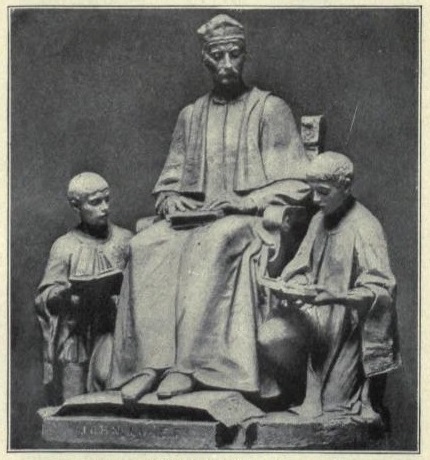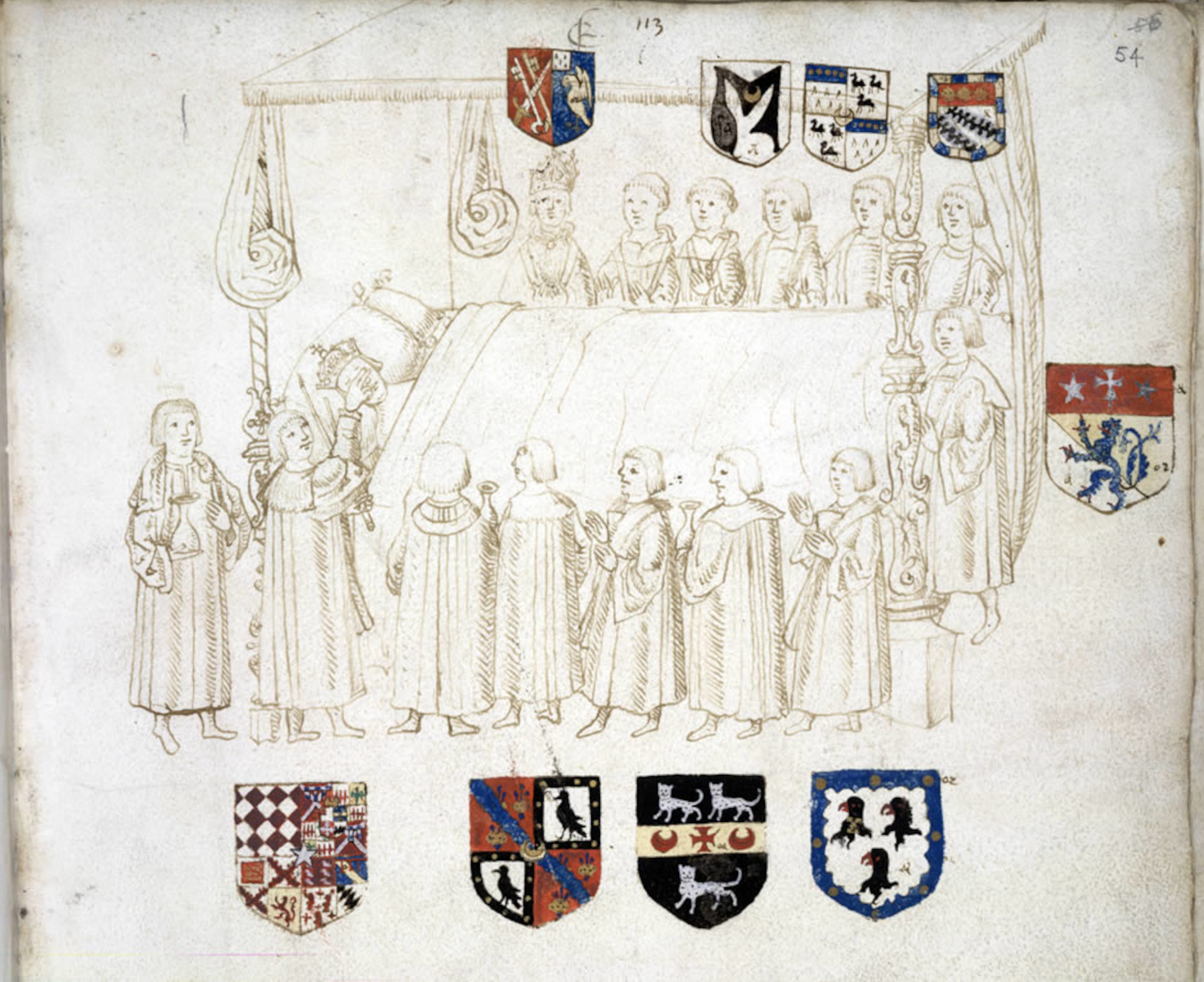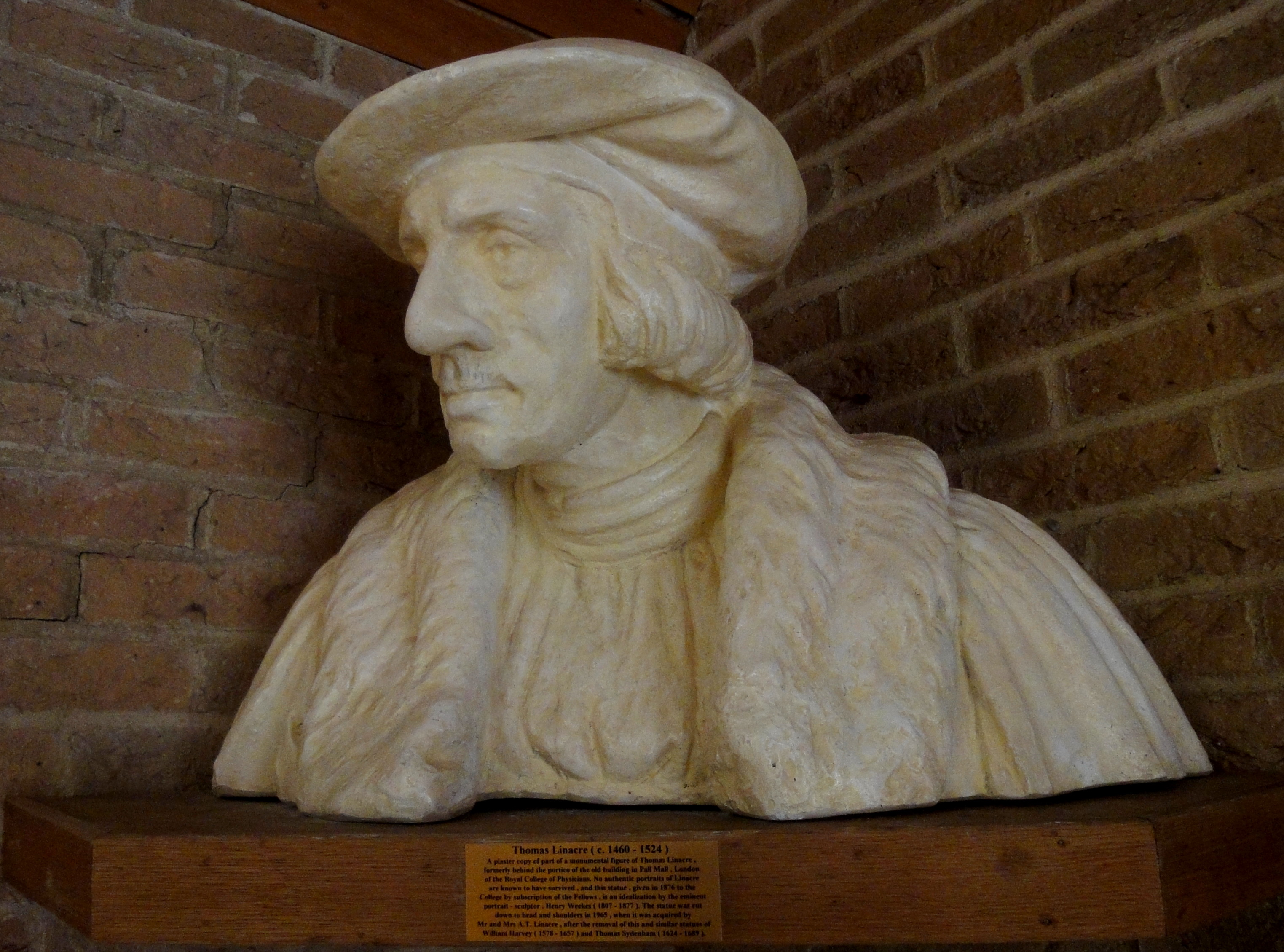|
William Lilye
William Lily (or William Lilly or Lilye; c. 146825 February 1522) was an English classical grammarian and scholar. He was an author of the most widely used Latin grammar textbook in England and was the first high master of St Paul's School, London. Life Lily was born in c. 1468 at Odiham, Hampshire and he entered the University of Oxford in 1486. After graduating in arts he went on a pilgrimage to Jerusalem. On his return journey he put in at Rhodes, which was still occupied by the knights of St John, under whose protection many Greeks had taken refuge after the capture of Constantinople by the Turks. He then went on to Italy, where he attended the lectures of Angelus Sabinus, Sulpitius Verulanus and Pomponius Laetus at Rome, and of Egnatius at Venice. After his return he settled in London—where he became friends with Thomas More—as a private teacher of grammar, and is believed to have been the first who taught Greek in that city. In 1510 John Colet, dean of St Pau ... [...More Info...] [...Related Items...] OR: [Wikipedia] [Google] [Baidu] |
Memorial To The Graves Lost In The Great Fire Of London, St Paul's Cathedral
A memorial is an object or place which serves as a focus for the memory or the commemoration of something, usually an influential, deceased person or a historical, tragic event. Popular forms of memorials include landmark objects or works of art such as sculptures, statues or fountains and parks. Larger memorials may be known as monuments. Types The most common type of memorial is the gravestone or the memorial plaque. Also common are war memorials commemorating those who have died in wars. Memorials in the form of a cross are called intending crosses. Online memorials are often created on websites and social media to allow digital access as an alternative to physical memorials which may not be feasible or easily accessible. When somebody has died, the family may request that a memorial gift (usually money) be given to a designated charity, or that a tree be planted in memory of the person. Those temporary or makeshift memorials are also called grassroots memorials.''Grassr ... [...More Info...] [...Related Items...] OR: [Wikipedia] [Google] [Baidu] |
John Colet
John Colet (January 1467 – 16 September 1519) was an English Catholic priest and educational pioneer. John Colet was an English scholar, Renaissance humanist, theologian, member of the Worshipful Company of Mercers, and Dean of St Paul's Cathedral, London. Colet wanted people to see the scripture as their guide through life. Furthermore, he wanted to restore theology and rejuvenate Christianity. Colet is an important early leader of Christian humanism as he linked humanism and reform. John Colet was a friend of Erasmus, a key figure in Christian humanism. Childhood and education The eldest son of Sir Henry Colet ( Lord Mayor of London 1486 and 1495), he was born in London in January 1467, and was educated at St Anthony's school and at Magdalen College, Oxford, where he took his M.A. in 1490. He was already nonresident rector of Dennington, Suffolk, and vicar of St Dunstan's, Stepney, and now became rector of Thurning, Hunts. In 1493 he went to Paris and then to Italy, stu ... [...More Info...] [...Related Items...] OR: [Wikipedia] [Google] [Baidu] |
Henry VIII Of England
Henry VIII (28 June 149128 January 1547) was King of England from 22 April 1509 until his death in 1547. Henry is best known for his six marriages, and for his efforts to have his first marriage (to Catherine of Aragon) annulled. His disagreement with Pope Clement VII about such an annulment led Henry to initiate the English Reformation, separating the Church of England from papal authority. He appointed himself Supreme Head of the Church of England and dissolved convents and monasteries, for which he was excommunicated by the pope. Henry is also known as "the father of the Royal Navy" as he invested heavily in the navy and increased its size from a few to more than 50 ships, and established the Navy Board. Domestically, Henry is known for his radical changes to the English Constitution, ushering in the theory of the divine right of kings in opposition to papal supremacy. He also greatly expanded royal power during his reign. He frequently used charges of treason a ... [...More Info...] [...Related Items...] OR: [Wikipedia] [Google] [Baidu] |
Thomas Hearne (antiquarian)
Thomas Hearne or Hearn (Latin: ''Thomas Hearnius'', July 167810 June 1735) was an English diarist and prolific antiquary, particularly remembered for his published editions of many medieval English chronicles and other important historical texts. Life Hearne was born at Littlefield Green in the parish of White Waltham, Berkshire, the son of George Hearn, the parish clerk. Having received his early education from his father, he showed such taste for study that a wealthy neighbour, Francis Cherry of Shottesbrooke (c. 1665–1713), a celebrated nonjuror, interested himself in the boy, and sent him to the school at Bray "on purpose to learn the Latin tongue". Soon Cherry took him into his own house, and his education was continued at Bray until Easter 1696 when he matriculated at St Edmund Hall, Oxford. At the university, he attracted the attention of Dr John Mill (1645–1707), the principal of St Edmund Hall, who employed him to compare manuscripts and in other ways. H ... [...More Info...] [...Related Items...] OR: [Wikipedia] [Google] [Baidu] |
Great Fire Of London
The Great Fire of London was a major conflagration that swept through central London from Sunday 2 September to Thursday 6 September 1666, gutting the medieval City of London inside the old Roman city wall, while also extending past the wall to the west. The death toll is generally thought to have been relatively small, although some historians have challenged this belief. The fire started in a bakery in Pudding Lane shortly after midnight on Sunday 2 September, and spread rapidly. The use of the major firefighting technique of the time, the creation of firebreaks by means of removing structures in the fire's path, was critically delayed due to the indecisiveness of the Lord Mayor, Sir Thomas Bloodworth. By the time large-scale demolitions were ordered on Sunday night, the wind had already fanned the bakery fire into a firestorm which defeated such measures. The fire pushed north on Monday into the heart of the City. Order in the streets broke down as rumours arose ... [...More Info...] [...Related Items...] OR: [Wikipedia] [Google] [Baidu] |
Old St Paul's Cathedral
Old St Paul's Cathedral was the cathedral of the City of London that, until the Great Fire of 1666, stood on the site of the present St Paul's Cathedral. Built from 1087 to 1314 and dedicated to Saint Paul, the cathedral was perhaps the fourth church at Ludgate Hill. Work on the cathedral began after a fire in 1087. Work took more than 200 years, and was delayed by another fire in 1135. The church was consecrated in 1240, enlarged in 1256 and again in the early 14th century. At its completion in the mid-14th century, the cathedral was one of the longest churches in the world, had one of the tallest spires and some of the finest stained glass. The presence of the shrine of Saint Erkenwald made the cathedral a site of pilgrimage.Milman, 22. In addition to serving as the seat of the Diocese of London, the building developed a reputation as a social hub, with the nave aisle, " Paul's walk", known as a business centre and a place to hear the gossip on the London grapevine. A ... [...More Info...] [...Related Items...] OR: [Wikipedia] [Google] [Baidu] |
Edward North, 1st Baron North
Edward North, 1st Baron North ( 1504 – 1564) was an English peer and politician. He was the Clerk of the Parliaments 1531–1540 and Lord Lieutenant of Cambridgeshire 1557–1564. A successful lawyer, he was created the first Baron North, giving him a seat in the House of Lords. Family Born about 1504, North was the only son of Roger North of Nottinghamshire, a merchant and haberdasher, and Christiana, the daughter of Richard Warcup of Sinnington, Yorkshire. After the death of Roger North in 1509, Christiana married, as her second husband, Sir Ralph Warren, Lord Mayor of London. Edward North had a sister, Joan, who married William Wilkinson (d. 1543), a mercer in the city of London, and sheriff in 1538–9, by whom she had three daughters. After her husband's death she was silkwoman to Anne Boleyn. She died as a Marian exile in 1556 at Frankfurt. Career Edward North studied at St Paul's School under William Lyly, and later entered Peterhouse, Cambridge, but seems never to ... [...More Info...] [...Related Items...] OR: [Wikipedia] [Google] [Baidu] |
Thomas Wriothesley
Sir Thomas Wriothesley ( ; died 24 November 1534) was a long serving officer of arms at the College of Arms in London. He was the son of Garter King of Arms, John Writhe, and he succeeded his father in this office. Personal life Wriothesley was born at Colatford Wiltshire. His name at birth was Thomas Writhe, and he was the eldest son and second of four children of John Writhe and his first wife, Barbara, daughter of John Castlecombe. The location of Colatford has not been identified, but it was either near Castle Combe or Cricklade. Wriothesley's first wife, whom he married before 1500, was Jane, daughter of William Hall of Salisbury. The pair had ten children together, though their only surviving son was Charles Wriothesley, Windsor Herald of Arms in Ordinary. His second wife was Anne, widow of Robert Warcop with whom he had a daughter who died in infancy. Wriothesley died "worn out with age" in London, on 24 November 1534, and was presumably buried with his family in St G ... [...More Info...] [...Related Items...] OR: [Wikipedia] [Google] [Baidu] |
Antony Denny
Sir Anthony Denny (16 January 1501 – 10 September 1549) was Groom of the Stool to King Henry VIII of England, thus his closest courtier and confidant. He was the most prominent member of the Privy chamber in King Henry's last years, having together with his brother-in-law, John Gates, charge of the "dry stamp" of the King's signature, and attended the King on his deathbed. He was a member of the Reformist circle that offset the conservative religious influence of Bishop Gardiner. He was a wealthy man, having acquired several manors and former religious sites distributed by the Court of augmentations after the Dissolution of the Monasteries. By 1548 he was keeper of the Palace of Westminster. Life Anthony Denny was the second son of Sir Edmund Denny (d. 22 December 1520), a Baron of the Exchequer, by his second wife, Mary Troutbeck, the daughter and coheir of Robert Troutbeck of Bridge Trafford, Chester. He had an elder brother, Sir Thomas Denny, of Bury St Edmund ... [...More Info...] [...Related Items...] OR: [Wikipedia] [Google] [Baidu] |
John Leland (antiquary)
John Leland or Leyland (13 September, – 18 April 1552) was an English poet and antiquary.Carley (2006), "Leland, John (''ca''. 1503–1552)" Leland has been described as "the father of English local history and bibliography". His ''Itinerary'' provided a unique source of observations and raw materials for many subsequent antiquaries, and introduced the county as the basic unit for studying the local history of England, an idea that has been influential ever since. Early life and education Most evidence for Leland's life and career comes from his own writings, especially his poetry. He was born in London on 13 September, most probably in about 1503, and had an older brother, also named John. Having lost both his parents at an early age, he and his brother were raised by Thomas Myles. Leland was educated at St Paul's School, London, under its first headmaster, William Lily. It was here that he already met some of his future benefactors, notably William Paget. Leland wa ... [...More Info...] [...Related Items...] OR: [Wikipedia] [Google] [Baidu] |
William Paget, 1st Baron Paget
William Paget, 1st Baron Paget of Beaudesert (15069 June 1563), was an English statesman and accountant who held prominent positions in the service of Henry VIII, Edward VI and Mary I. Early life He was the son of John Pachett or Paget, one of the serjeants-at-mace of the city of London. He was born in Staffordshire in 1506, and was educated at St Paul's School when William Lily was its headmaster, and at Trinity Hall, Cambridge, proceeding afterwards to the University of Paris. At St Paul's, he befriended the future antiquary John Leland and later acted as one of his benefactors.Carley, "Leland, John (''c''.1503–1552)" Political career He served as Member of Parliament for Lichfield in 1529 and for Middlesex in 1545. Probably through the influence of Stephen Gardiner, who had early befriended Paget, he was employed by King Henry VIII in several important diplomatic missions; in 1532 he was appointed Clerk of the Signet and soon afterwards of the privy council. He beca ... [...More Info...] [...Related Items...] OR: [Wikipedia] [Google] [Baidu] |
Thomas Linacre
Thomas Linacre or Lynaker ( ; 20 October 1524) was an English humanist scholar and physician, after whom Linacre College, Oxford, and Linacre House, a boys' boarding house at The King's School, Canterbury, are named. Linacre was more of a scholar than a scientific investigator. It is difficult to judge his practical skill in his profession, but it was highly esteemed in his own day. He took no part in political or theological questions, but his career as a scholar was characteristic of the critical period in the history of learning through which he lived. He was one of the first Englishmen to study Greek in Italy, and brought back to his native country and his own university the lessons of the " New Learning". His teachers were some of the greatest scholars of the day. Among his pupils was one—Erasmus—whose name alone would suffice to preserve the memory of his instructor in Greek, and others of note in letters and politics, such as Sir Thomas More, Prince Arthur and Queen M ... [...More Info...] [...Related Items...] OR: [Wikipedia] [Google] [Baidu] |







.jpeg)

